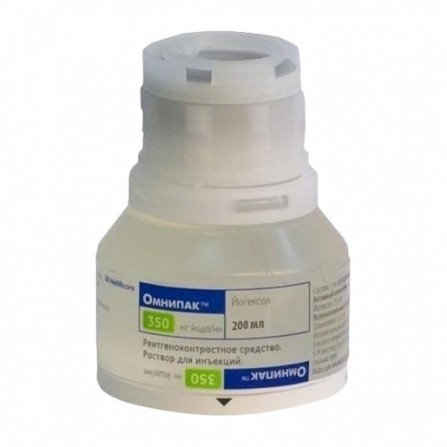Omnipaque ampoules 350mg ml 200ml N10
Condition: New product
1000 Items
Rating:
Be the first to write a review!

More info
Release form
Ampoules
Composition
In 1 ml .: iodine (in the form of yogexol) 350 mg. Excipients: Trometamol, sodium calcium edeate (EDTA), hydrochloric acid (for pH correction) and water for injection.
Pharmacological effect
Radiocontrast diagnostic non-ionic monomeric agent. It has a low osmolarity. Yohexol is well soluble in water, contains approximately 46.4% iodine. The time to reach maximum radiopacity with normal myelography is up to 30 minutes (after 1 h it is no longer visualized). During CT, visualization of contrast in the thoracic region is possible for 1 hour, in the cervical region - about 2 hours, and in basal cisterns - 3–4 hours. Contrasting of the articular cavities, uterus, fallopian tubes, peritoneal protrusions, pancreatic and bile ducts, and bladder is achieved immediately after administration.
Indications
Intravascular use: angiography of the lungs, head, neck, brain, abdomen, kidneys. angiocardiography, aortography, phlebography, urography. computed tomography (resolution enhancement). Subarachnoid application: lumbar myelography, thoracic myelography, cervical myelography, computed tomography of basal cisterns. Intravascular use: arthrography, retrograde endoscopic pancreatography, retrograde endoscopic cholangiopancreatography, herniography, hysterosalpingography, sialography. Oral administration: gastrointestinal studies.
Contraindications
Pregnancy, hypersensitivity to iodine-containing contrast media. Subarachnoid administration: epilepsy, technical failure during myelography (immediate repeated examination is contraindicated), infectious diseases.
Use during pregnancy and lactation
It is used with caution when it comes to indications of a history of allergic reactions to radiopaque agents, in case of bronchial asthma, pollinosis, food allergies, thyrotoxicosis, myelomatosis, diabetes mellitus, marked impaired liver function and / or kidneys, dehydration, decompensated cardiovascular diseases (t chronic heart failure), in chronic alcoholism, multiple sclerosis, pheochromocytoma, sickle cell anemia, thromboangiitis obliterans (Buerger's disease), acute thrombophleus fuck, severe atherosclerosis, in old age, during lactation. during lumbar puncture for local or systemic infections.In patients with an increased risk of allergic reactions, it is advisable to carry out preliminary therapy of corticosteroids and / or antihistamines. Consideration should be given to the possibility of dehydration in patients with severe thyrotoxicosis, myelomatosis. In patients with diabetes mellitus and serum creatinine concentrations of more than 500 mcmol / l, the use of yoghexol is possible only in cases of emergency. It is necessary to carefully monitor the patient in case of suspected lowering of the convulsive readiness threshold. After the use of yogexol, the thyroid gland tissue iodine-binding capacity is reduced for a period from several days to 2 weeks.
Dosage and administration
Dose set individually, depending on the evidence, age and body weight of the patient.
Side effects
When intravascular use: nausea, vomiting, pain at the injection site, a temporary sensation of heat, redness of the skin. When subarachnoid application (for myelography): headache, transient dizziness, pain in the back, neck, limbs, paresthesia, nausea, vomiting. in isolated cases (in predisposed patients), convulsions. registered case of aseptic meningitis.
special instructions
When intravascular use: nausea, vomiting, pain at the injection site, a temporary sensation of heat, redness of the skin. When subarachnoid application (for myelography): headache, transient dizziness, pain in the back, neck, limbs, paresthesia, nausea, vomiting. in isolated cases (in predisposed patients), convulsions. registered case of aseptic meningitis.


